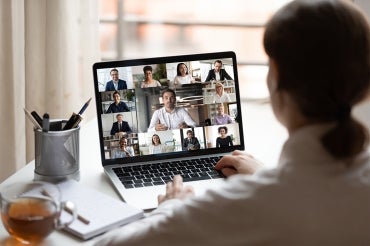U of T expert shares tips and best practices for job hunting, virtual networking

Published: December 14, 2020
For many, networking is an uncomfortable experience at the best of times. But what happens when you are stuck at home behind a computer?
 While the prospect of finding a job during a pandemic is daunting, there are steps University of Toronto students and graduates can take to stand out from the virtual crowd – particularly if you happen to be in a health-related field.
While the prospect of finding a job during a pandemic is daunting, there are steps University of Toronto students and graduates can take to stand out from the virtual crowd – particularly if you happen to be in a health-related field.
“There’s never been more attention paid to health care or the importance of scientific discovery,” says Monica Gautam, assistant professor, teaching stream, and industrial pharmacy residency program co-ordinator at the Leslie Dan Faculty of Pharmacy.
“I encourage everyone to think about leveraging this visibility when embarking on their career.”
Gautam, who is also managing director at COMPASS Medical Affairs Consulting and Medical Affairs Canada, is considered by many to be the Faculty of Pharmacy’s “personal branding guru.” She recently agreed to share her insights and career advice with pharmacy and pharmaceutical sciences graduates – though her tips on virtual networking and job interviews are applicable to any U of T student or grad who is seeking to launch a career during COVID-19.
How do you approach networking in a virtual setting?
First off, I would say that networking events are still happening, albeit virtually, so I’d strongly encourage students and graduates to seek out opportunities and attend. Networking isn’t less awkward online. We still need to do the work: prepare, show up, meet new people and reconnect with established contacts electronically.
There are also some practical things that students can do. I’d encourage folks to dress professionally, ensure the lighting is good, position their webcam strategically (it’s better to be looking up than down). Manage your expectations – it’s better to engage meaningfully with two or three people than simply exchanging contact information with 10 people. And always follow up or connect on LinkedIn in a timely fashion after the event.
We can also leverage virtual communications tools to maximize the experience. For example, briefly share your screen if you need to walk through slides to support your discussion. Ultimately, however, you want to maximize your screen space to make the most out of personal engagement. I strongly urge you to test features in advance before giving a presentation. And don’t forget to smile – you want to stand out for right reasons.
Do you have a go-to question that you ask people in networking settings that gets people talking?
I don’t necessarily have one specific question, but people love to talk about their experiences and insights. Something students or recent graduates could ask is: “You’re so accomplished in your career, what advice do you have for someone starting out?”
I also suggest looking for people who are master networkers — those who seem to work the room with ease — and ask to join them.
What’s your approach to networking?
I try to set metrics for myself every month. I set goals for how many people I want to reconnect with and how many new people I want to meet.
I also prepare for each networking event. If it’s a speaker panel followed by networking, I research each panelist. If it’s a sponsored event, I’ll make sure I’m knowledgeable about the organization.
What advice would you give individuals looking for a job right now?
While it is a challenging time to be pursuing a job, remain positive. It’s a full-time job to find a job. Discipline, perseverance and initiative are critical. Employers are not knocking on your door and it’s not uncommon for it to take more than six months to find a job.
I encourage people to be open to – and make the most of – contract roles like maternity leaves, which are excellent opportunities to gain experience. Plus, if you land a contract position, it’s easier to find a job when you’re employed. For students and recent graduates, your first job is likely not going to be your dream job or your last job.
In this uncertain environment, companies are likely to use short-term contracts to fill gaps or allocate resources in creative ways. Applicants must be equally open and creative in their job-seeking approach.
A final word of advice is to be wise in your choice of references. It’s critical to select individuals who can truly speak to your work and character, which may or may not include professors. If you ask one of your professors and they decline, don’t take it personally. They likely feel unable to speak to all of your qualities. Also, never put a reference down without their knowledge.
Have you interviewed any job candidates virtually? Can you share some techniques that impressed you? Any that turned you off?
I’ve conducted about 30 interviews virtually and there are some things that stand out. I’m impressed by candidates that are respectful of time, prepared, pleasant and, when applicable, can deliver an expertly prepared presentation.
I appreciate those who tell a story rather than reading slides and seamlessly navigate technology. I also like when candidates effectively engage their audience by stopping their screen share during the discussion and don’t worry about finding the right slide to answer questions. These people exude a sense of calm and find ways to share their enthusiasm and personality when connecting with the interview panel.
Memorable candidates take the time to do something different such as administering quizzes, using polling features, asking insightful questions or sharing a unique experience.
Since the competition for top talent is high, employers are realizing they must be more efficient with hiring practices. So, I think students and graduates can expect more phone pre-screening interviews followed by a panel-style interview with three to four panelists.
There are also things that stand out for the wrong reasons. It’s always difficult when candidates don’t know how to use the technology. I’m forgiving – if it’s a genuine glitch, don’t sweat it – but test the technology ahead of time. Make sure you have the appropriate volume, find a quiet space and dress professionally. And make sure you are well prepared – it shows.
How are you building relationships during a time of limited face-to-face contact?
I try to be consistent about booking regular virtual coffee meetings, even if it’s just 15 minutes long. And it doesn’t always have to be about business. Ask how people in your network are adapting to the new normal and just check in. Most people are stuck in meeting after meeting and are craving social connection.
I like when people in my network let me know that they’ve moved on to another role, or when they published an important paper – these are great opportunities to quickly touch base and acknowledge their accomplishments. It’s a balance to delicately check in without being intrusive, but you must not reach out only when you need something.
I recommend using platforms like LinkedIn to your advantage. It’s a great way to connect during a time of limited face-to-face contact – plus it allows you to showcase successes while recognizing the people that helped you get there. It’s okay to toot your own horn.
Finally, when building your network, which starts with your peers, think about who else you need to help you achieve your goals – for example, someone in a different sector or new area of work that you want to pursue. I encourage reaching out to people outside of your circle by asking for an introduction or informational interview with decision-makers.
The pandemic brings tremendous uncertainty, but are there any upsides?
Never has there been more attention on health care or the importance of scientific discovery. Everyone sees clinicians and researchers making an impact on the news. Both pharmacists and pharmaceutical scientists are in the public eye now more than ever. It’s a great opportunity to leverage this visibility.
Health-care professionals are recognizing the value that pharmacists have in a community setting. When a COVID-19 vaccine is made available, pharmacists will be instrumental in vaccination education, distribution and administration.
It’s also a time when drug discovery and disease diagnostics are part of the public discourse. I urge pharmaceutical scientists to talk about their research impact to potential employers and not to underestimate the value of their personal story.
Finally, I would say that it’s easy to lead when times are easy. Challenging periods test our resilience and separate the true leaders from others. Now is the time to build critical skills, hone your personal brand and differentiate yourself from the pack.



